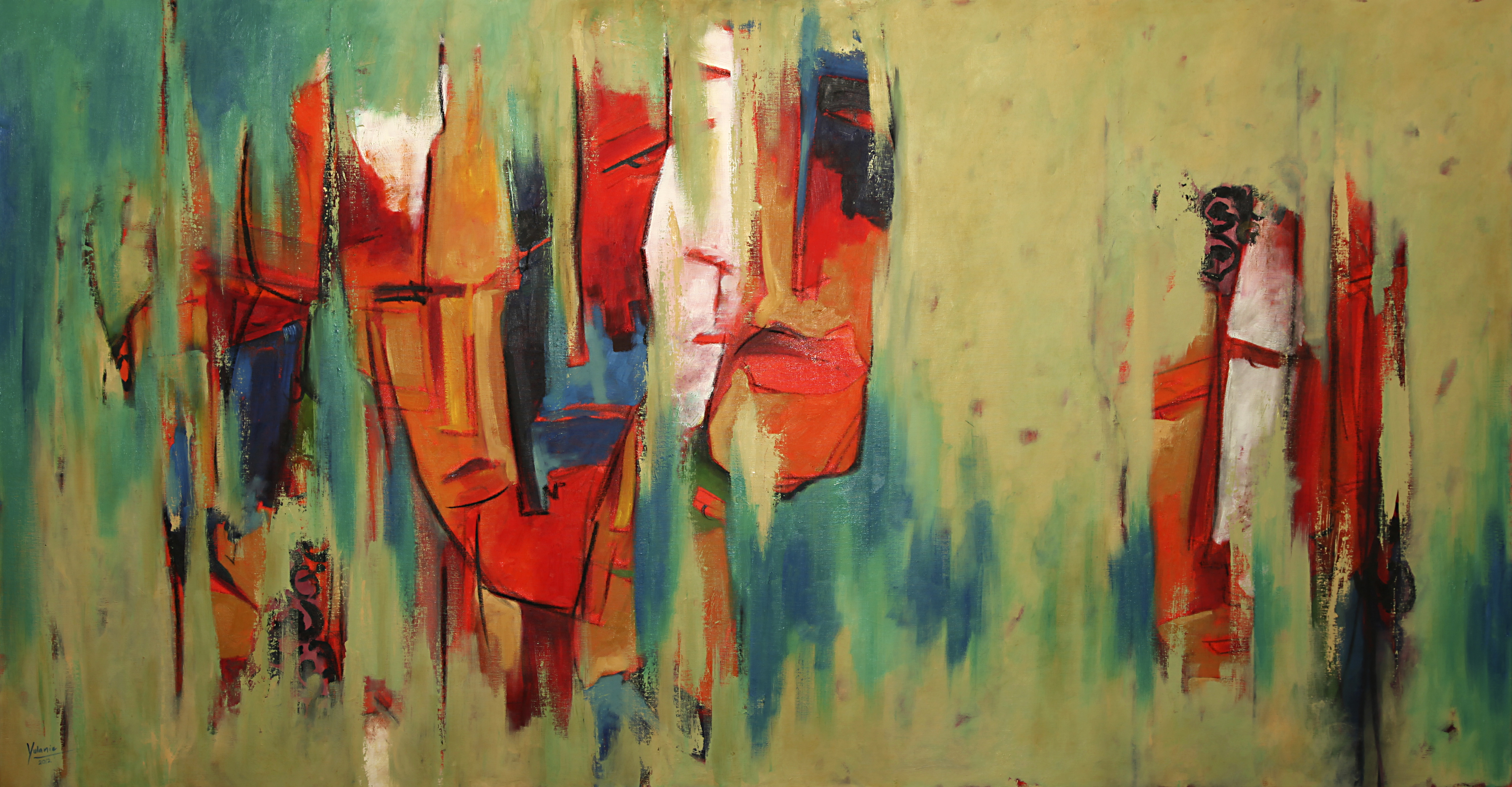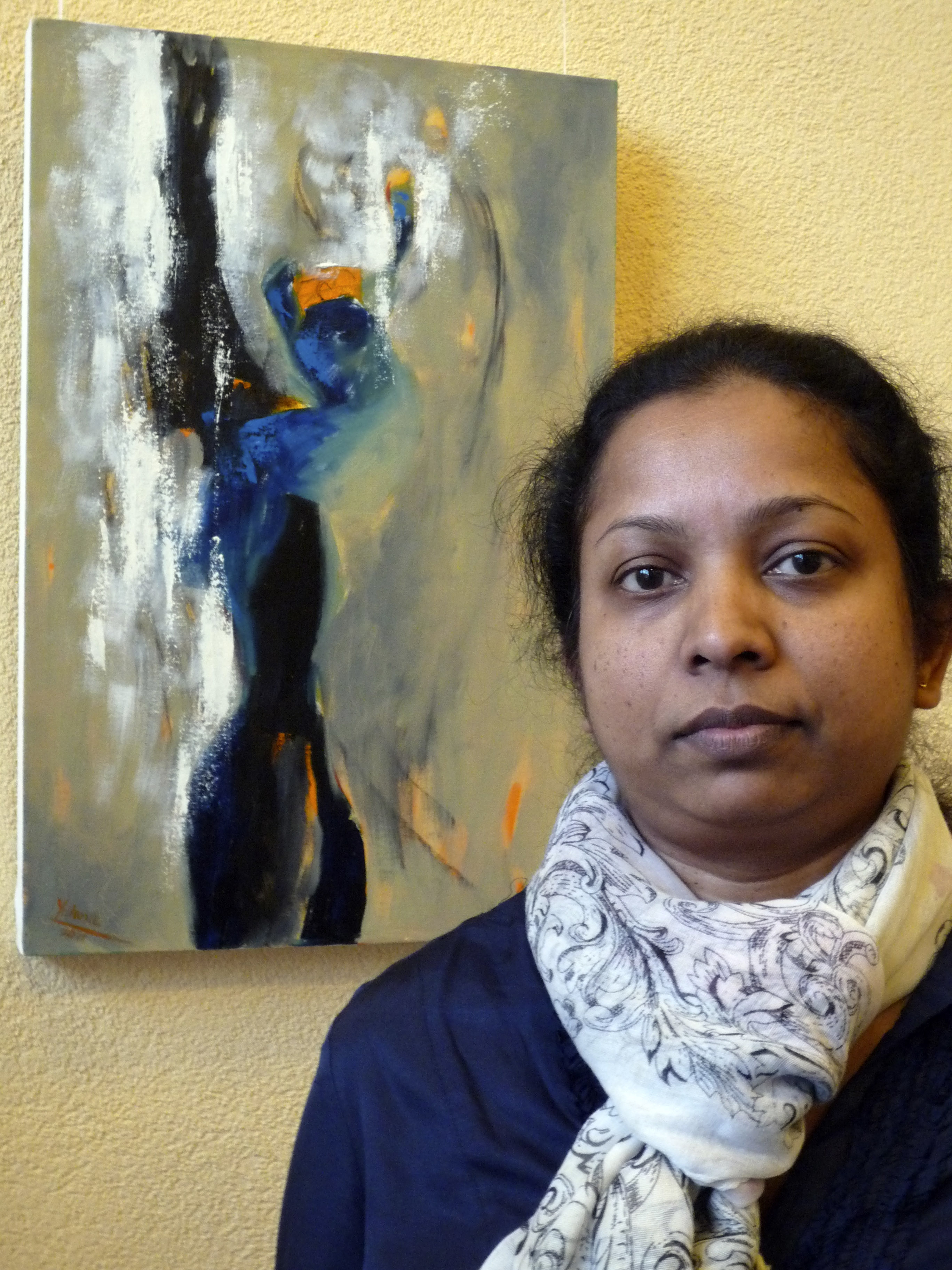
“I paint their faces so as not to forget them”

Yulanie Perumbadage, a Sri Lankan of Singhalese origin who lives in Schaffhausen, talks to swissinfo.ch about life as a politically engaged artist in exile. She and her husband were forced to flee the island in 2009.
“I paint to show what the war has done to Singhalese society,” said the petite artist.
A figure stretches its arms across the blue, grey and white canvas, entitled ‘Réveille’ [Awakening].
“It is only possible to experience an awakening through our guilty conscience. If we don’t have courage to accept the atrocities committed by us as a majority community against others, a genuine reconciliation is an impossible goal,” she declared.
The Singhalese constitute the largest ethnic group – three-quarters of the population or 15 million people – in Sri Lanka but there are many other ethnic minorities including Tamils and Muslims.
A discreet smile flashes across Yulanie’s face, a happy contrast with the storm and chill wind whistling outside the LivrEchange cultural library in Fribourg.
The oil painting is part of her new exhibition being shown at the library until February 27 – a collection of evocative memories and political symbols.
The 41-year-old was forced to flee the southeast Asian nation with her journalist husband in 2009 after they received growing threats. Employed as an art school teacher, Yulanie was also politically active and among her work had produced several anti-war paintings.
From 2006 as the Sri Lankan government increased pressure on the Tamils in the north and east, intellectuals, artists, opposition politicians and journalists also started to feel the heat.
“Members of groups with different ideas were pursued as enemies of the state and criminals who had to pay for their acts and were attacked in the streets. At the time you couldn’t write anything publicly against the war,” she explained.
Artists were under pressure, not just from the authorities but increasingly from Singhalese people.
“There were lots of incidents with school staff members and neighbours threatening me for being a traitor. My husband received lots of threatening phone calls and messages and he was put on a hit list. The first person on the list was killed,” she added.
With a heavy heart the couple fled their homeland for Switzerland leaving behind their families and friends.
“I realised that it was no longer possible to continue my artistic struggle for a better world in my own country,” she said.

Skype contact
Switzerland is now her home. Schaffhausen is a beautiful place, she says, and the people are very welcoming. She recently read an article that Switzerland was the best place to be born. But life here is not easy. The possibility of seeing her family again remains just a distant “dream”; they rely on Skype to stay in touch.
“Living in exile is very difficult. It’s an unspeakable feeling,” she continued. “When I came here I couldn’t figure out what was going on. But thanks to help from the asylum office I’ve regained courage and picked up my brush again.”
Colourful cubist portraits stare at us from the library wall.
“I live here with the memory of my friends and parents. I paint their faces so as not to forget them,” she said. Her calm demeanour masks her inner turmoil.
Curious upbringing
Yulanie was born into a family of school teachers in a rural area near Kurunegela in north-west Sri Lanka.
“I didn’t have a luxurious life but my parents always earned enough to cover our basic needs. When they got their salary it was their habit to always buy me a book,” she smiled.
She was a curious child and from a young age questioning life’s inequalities became second nature: why do the children living next door go to bed without any dinner? Why are local farmers in debt to rich landowners and mistreating their families?
But her teenage years were marked by left-wing and nationalist uprisings and the deaths of many young Singhalese, including many of her school friends, which deeply shocked her.
“I saw so many burning bodies on the roads. Earlier they’d been tortured to death and to dissuade others they were burned in public. This was the situation in southern Sri Lanka where the vast majority of Singhalese lived,” she commented.
Sri Lankans are one of the biggest migrant groups in Switzerland.
There are 42,000 people of Sri Lankan origin in the country. Between 90 and 95 per cent of them are Tamils.
One third of the Sri Lankans with permanent residence or Swiss citizenship were born in Switzerland.
The Tamils in Switzerland live mainly in the German-speaking areas, particularly in the cantons of Bern, Zurich and Basel.
The influx of Tamil refugees to Switzerland started in 1984 after the flare-up of the conflict in Sri Lanka aimed at the creation of a separate Tamil state in the north and eastern part of the island. Up until around 2004 there were important inflows of refugees from Sri Lanka.
Vermillion and crutches
Violence and the ugly physical and psychological consequences of the 26-year-old war between the government and the Tamil rebels would become recurrent themes in her work.
“I like using bright colours; vermillion is my favourite,” she added.
Large red canvases dominate the next space covered by hundreds of tiny crutches.
“Every year there were more and more people in the streets with crutches and prosthetic limbs. Behind their crutches I saw their sad stories. You can count all the numbers of people who suffered terrible war wounds, but the irremediable damage to society cannot be measured.”
In another image a pile of metal-and-plastic crutches lean against traditional paintings normally found in a Buddhist temple.
“After a soldier is killed their family gets financial support. Buddhist monks celebrated them as heroes and worshipped them. Any sadness was wiped out and replaced by a warrior-like enthusiasm. Many of my neighbours who I played with as a child are dead. Some I met in the street are without an arm or leg,” she noted.
“The war is officially over. But there is no winner and no peace. There are just people with crutches.”
From far away she still reflects on the political situation back in her homeland. And despite the distance imagines she can somehow make a difference to heal the wounds.
“I only have my pencil and brush as tools but I hope to build something here in Switzerland. I’m trying to work with Tamils and Swiss people to build up relations,” she concluded.

In compliance with the JTI standards
More: SWI swissinfo.ch certified by the Journalism Trust Initiative




























You can find an overview of ongoing debates with our journalists here . Please join us!
If you want to start a conversation about a topic raised in this article or want to report factual errors, email us at english@swissinfo.ch.